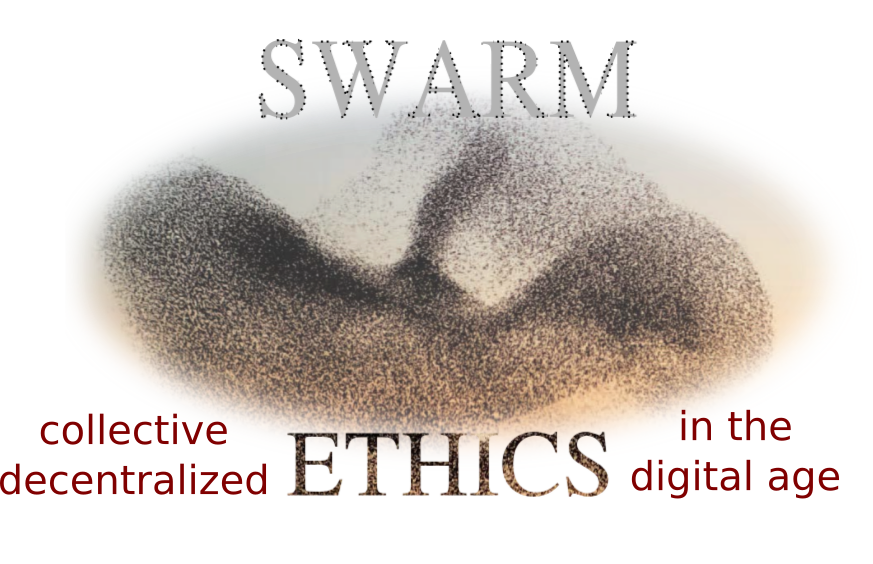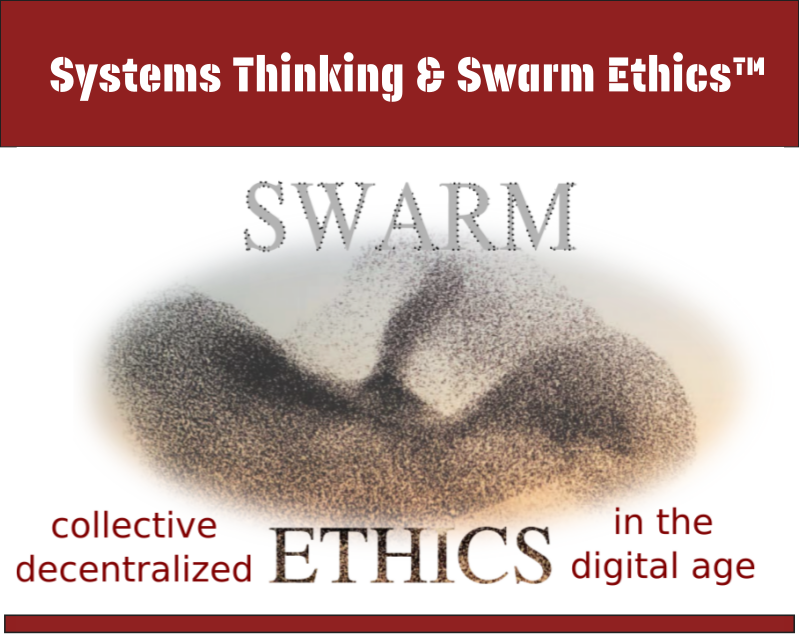Daniele Proverbio

Swarm Ethics™ and Systems Thinking
Why we need to go beyond individualistic and linear paradigms in thinking of ethics, and how swarms break through.
Intuition, revisited.
First came the instinct, then intuition, then linear science, finally the loops (maybe).
If we had to drastically summarise thousands of years of how human got to understand the world, this would be a decent attempt. Instinct immediately allowed to make sense of what is harmful and what is not, reacting to prompts and inputs from the environment. Then, intuition helped to infer the most basic properties of natural phenomena, like that harvests followed natural seasons or that piled bricks make up for good sheltering. Intuition got more and more refined with logic and structured thinking over the centuries, until the rise of modern “science” about four centuries ago (the exact date can be disputed, but this is not the right place).
Almost all the science until the late XIX century, however, was drastically linear. If A cause B, changing A by a certain amount would case a direct and strictly proportional change in B. Systems were considered closed: a thermal engine is determined by what happens within, the moon and Earth are fairly unaffected by other celestial bodies, so their orbits can be determined by relatively simple rules.
Science, as usual, affected people’s thinking. Intuition still played, and plays, an enormous role in personal life – we “just” ride a bike, we “feel” that an M&A is right when the time is ripe. Nonetheless, scientific reasoning allowed strategic planning, structured discussions, and testable predictions. Not to mention the immediate use of scientific models to perform various technological, economic and strategic tasks – the simplest one being the linear projection of companies’ financial outcomes that still determine, in essence, their market value.
Albeit linear thinking has been extremely successful in a variety of fields, it was recently understood that it may be insufficient in equally many occasions, from business learning to innovation development. Several companies are thus incorporating loops in their processes, usually structured as innovate-process-test-evaluate-innovate. These loops are extremely powerful to ramp up the internal capabilities and turnovers, not to mention product development. Once again, the hint came from scientific research, where control engineers routinely employ control loops to speed up or dampen certain system’s functions.
Complex systems and complex thinking
Loop thinking is already showing its limitations. To face social uprise, climate change, polarization and infodemics, global economical and governance turmoil, they are too limited. Wicked problems need complex thinking. Complex systems entail the study of interconnections, of open systems with varying outputs, of convoluted feedback loops, of new phenomena emerging from seemingly simple rules, of accelerating trends. They embrace an increasingly volatile and chaotic world, digging for conserved properties, stability and probable outcomes. Their motto is to recognise complexity, limiting difficulty. Systems thinking thus require recognising subtle challenges, forecasting nonlinear consequences, and agilely planning ahead.
Complex systems, in particular, include swarms. Swarms are collections of interacting individuals, powered by relatively simple rules, yielding spectacularly emergent coordination and alignment. In the natural realm, swarms are formed of bird or insects, capable of coordinating by following local behaviours. In human societies, “human swarms” are those which, without being controlled nor having engrained rules, self-cooperate towards social goals.
Enters Ethics
Ethical thinking was born during the era when intuition was becoming more systematised. It then progressed into the era of linear science with an enormous challenge: explaining drastically human features like the concepts of “good” and “bad” behaviour, extremely difficult to frame in systems terms. Philosophical debates urged definitions and the research of common principles to explain them. Linearly, the most investigated hypotheses have been the intrinsic nature of human beings, or external, omniscient and omnipotent “controllers”, able to homogeneously equip humans with alike principles. “Discovering” such principles thus become imperative, as well as their presentation to society. In this perspective, loops for self-reinforcement or adaptation of ethical principles are potentially not even necessary. Are we thus compelled to believe that ethical humans, as well as ethical organisations, are intrinsically defined as such?
Swarm Ethics™: a New Paradigm
Swarm Ethics™ proposes a solution to this impasse. It fully recognises people, as well as societies, as complex entities, formed and guided by social norms and trends, dynamic, open and thriving. It refuses the idea of static ethics, interpreting it as an emergent property of moral agents, i.e., agents looking for shared consensus on what is good and what is bad, to prosper within societies. Ethics is the result, not the starting point. Hence, Swarm Ethics™ empowers people and organisations in the search of “goodness”, of social impact, environmental responsibility and harmony.
In this respect, Swarm Ethics™ stands to classical ethics like complex systems thinking stands to classical science: it is not an add-on, but rather a drastically more powerful way of looking at reality. It builds on the crucial role of trust in human interactions and harnesses the power of self-organization to shape long- and short-term trends and consensus. It fully recognises the openness of systems, the mutual and constant interplay of ideas, surpassing relativism but leveraging the dynamics of cross-contaminations. Also, it includes the role of information, of its spreading and of agents accelerating such spread, making sense of the impact of new technologies and widening the concept of responsibility.
An immediate implication of Swarm Ethics™ is that it embeds ethical thinking into strategies and operation management. The revolutionising feedback between the ethical and the business realm is finally accounted for. As innovation plays a role in triggering systems thinking, individual moral values – shared, discussed, evolved – have the power to impact business opportunities in non-trivial fashion. Instead of just relying on intuition, the complex systems methods described above allow to make sound inference and effective predictions, as well as forecasting plausible scenarios for actionable decisions. In addition, Swarm Ethics™ unveils the role of information and related emerging technologies, like AI, Web 3.0, federated learning and the like, in the human process of defining ethical boundaries. With mutual discourse with policy-making and law, it will also allow to redefine key concepts like responsibility, social impact, transparency and more.
Future Directions and Conclusion
Scientific research inspires human thinking and is propelled by innovation challenges. Future research will further develop and refine methodologies and frameworks to seamlessly integrate collective swarm intelligence, ethical reasoning and world complexity. Companies wishing to remain competitive in this turbulent world have the unique opportunity to start developing system thinking, Swarm Ethics™ reasoning and adaptive planning. Once, there was linear thinking. Now, it is time to move forward.

